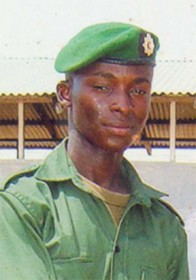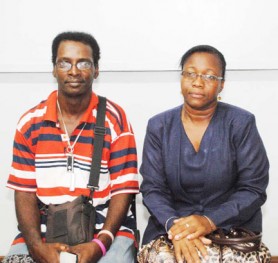A year after their son’s decomposed body was removed from the Ekereku River a week after his disappearance from the Guyana Defence Force border post at Eteringbang, Julian and Denise Marks talk with Guyana Review editor Arnon Adams about the still unexplained circumstances of Private Julian Machel Miquel Marks’ untimely death.
To this day no one can say – or, perhaps, is prepared to say – exactly how, why or when Private Marks died. The twenty-three year-old Signaller went missing from the Guyana Defence Force Base at Eteringbang on November 16 last year. On November 23 his body was removed from the Ekereku river, decomposing, with a horrible wound at the back of his head. The army told the Marks’ that they have done an enquiry. The outcome, however, have not been made known to them.
Those are the bare details of Private Marks’ death. The rest is entangled in a web of conjecture suspicion. His parents believe there is more, much more to their son’s death than has come to light up to this time. They are blunt about their suspicions. The army, they believe, knows far more about their son’s death than it has disclosed so far and as far as finding out more is concerned they believe that they have hit a proverbial wall. A year on, the Marks’ appear determined that their son’s story will not simply go away.
At an earlier stage in his life Private Marks’ had wanted to become an army officer. His background may have made him an appropriate candidate. He attended Bishops High School and worked as a bank clerk before turning his attention to the military.
His first application had been unsuccessful and he had applied twice thereafter. He was a budding artist and a fond child, his mother says.
It turned out that Private Marks decided to serve three years as an ordinary soldier with the intention of applying again. He served nineteen months of those three years before his death.
His mother says that before his brutal and untimely end he had grown to dislike the army or, more particularly, the ill-treatment which she said he suffered at the hands of a particular officer. “He wanted to leave but I told him that he had made a choice and that he should stay with it. I regret telling him so.”
During our conversation Julian and Denise Marks raised a number of likely scenarios about their son’s death, their suspicions fuelled by what they say has been the refusal of the army to be more forthcoming. What bothers them, they say, is a conviction that there are people who know exactly how and why Private Marks was killed but who, for one reason or another, refuse to say. His mother, particularly, insists that they should be told the truth. It will not bring him back, she says, but her family needs closure.
Some of the theories surrounding Private Marks’ death border on the bizarre. The Marks’ say that they have heard it said that their son may have been buried earlier then his body exhumed and thrown into to river. His mother also points to what she says is the fact that while his body was found several miles away from the camp his clothing was found just a few hundred yards away. The theories, the enduring mystery cling to their consciousness like limpet mines. Only the truth, they say, will disperse them.

If Julian Marks appears to have come to terms with the loss of his son his wife appears less inclined to let go. She is quieter, more reflective but when she speaks her voice reveals a restrained emotionalism, a demeanor that suggests that at any given moment she may break down in tears, re-living the unresolved experience of just over a year ago when her son was taken from her. Denise Marks is angry with the army and more mindful than her husband that that fact be known. “They know how my son died,” she says, “and they should tell us.”
Julian’s philosophical outlook has about it an overarching cynicism. In the immediate aftermath of his son’s death he had worked with the army to try to finds answers. Some things had not gone well…like the day his scheduled trip to the location at the invitation of the army had been delayed as a result of a defective aircraft tyre. “Long before we eventually left Timehri word had arrived in Georgetown that the body had been found. No one bothered to tell us,” he says. Marks reflects too on the dichotomy between what he believes has been the evasiveness of the military with regard to the circumstances of his son’s death and the full military honors accorded his decomposed remains in a sealed coffin wrapped tightly in the Golden Arrowhead on November 27th last year. His views on how he felt the military behaved are restrained, more subtle than his wife’s, but, nonetheless, unmistakable.
The Marks’ are full of reflections. They both recall elements of his childhood, Julian in proud, animated tones and Denise with an expression of subdued sadness. A smile alters her countenance momentarily as she recounts “those times when he used to appear suddenly at the back door, in his uniform”, on brief visits home. The reflection is her best moment of the entire interview. Those, obviously, are among her fondest memories of her son’s army life. She wants closure though she is unsure of where or when she will find it and while she has had to return to the rest of her life, her three other children, her job and her pursuit of a degree at the University of Guyana, Denise Marks refuses to leave her firstborn behind. The absence of closure remains a burden that is plainly etched on her countenance. She spares a thought too for other mothers who have lost sons to the military in circumstances which remain ill-explained.

Then she raises her own questions like the fact, she says, that her son was only discovered missing from base at around 11:00 hrs on the day after he disappeared. She wonders whether it ought to have taken the post at Eteringbang almost half of the new day to discover that her son – the army Signaller at a highly sensitive location – had disappeared.
There has still been no word about the directive by the Director of Public Prosecutions that there be an inquest into Private Marks’ death. His parents cling to the hope that there will, eventually, be an inquest that will bring them closer to learning how and why they lost their son. The Marks’‘ are still waiting on the police to say when the inquest will be conducted. The difficulty he says is that such initial investigations as were carried out into his son’s death were conducted primarily by the army. “I hope you understand when we tell you that we have lost faith in the army.” There is a note of apology in Julian Marks’ voice.




